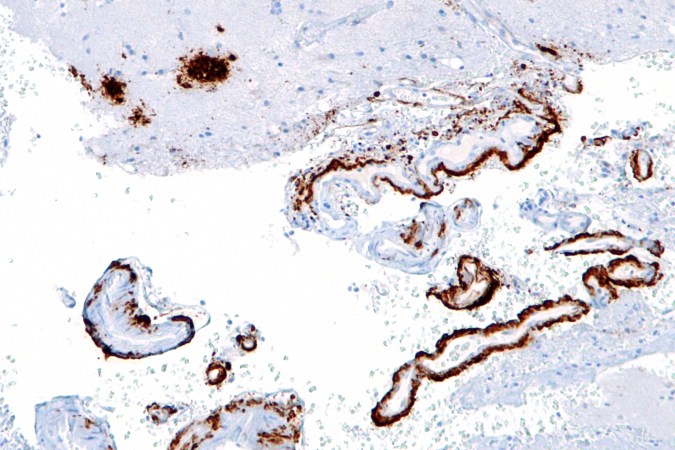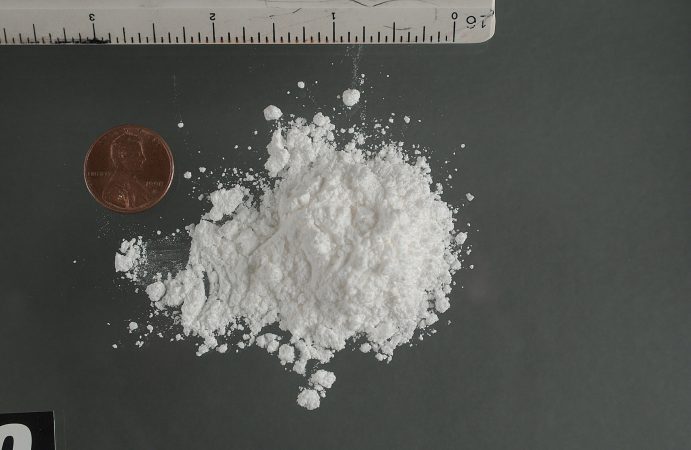

Klotho, in ancient Greek mythology, is one of the Fates controlling the span of human destiny tasked as she was with cutting the string that determined the length of a person’s life. Klotho is also a naturally occurring hormone in the body. More than two decades ago, Japanese researchers discovered that this hormone plays a role in aging. People with more klotho in their body, tend to live longer and to retain more of their faculties—that is to stay sharp—well into old age.
“There are many elderly people who walk around and have completely normal, sharp vibrant brain function despite the fact that they are much older and the fact that they have a lot of disease toxins in the brain,” Dr. Dena Dubal a neurobiologist at the University of California, San Francisco’s Memory and Aging Center told Popular Science.
Dubal is the author on a study released today in the journal Cell Reports that looks at what happens to brain function when you inject klotho protein into mice.
Aging researchers like Dubal aren’t interested in extending life for its own sake—they don’t have a Methuselah complex—but rather because aging is the biggest factor for disease. If they can find a way to slow aging, or at least its effects, they might find a way to allow us to avoid the cognitive declines, and diseases such as stroke, heart disease, and diabetes that tend to come as we flip through more pages on the calendar.
“A few years ago, we discovered in collaboration with several people that in human populations those people that had higher levels of klotho had better cognitive functions in normal aging,” says Dual.
Which is great if you happen to be genetically blessed with higher levels of klotho, less great if you’re not.
Earlier studies have looked at the impacts of klotho on longevity and health, including brain health, but they tended to rely on genetically modified mice. The genes of these mice had been modified to allow them to produce more klotho or less.
Those studies found that mice modified to produce more klotho lived longer, which is promising. But despite recent advances, genetically modifying humans is still an ethical minefield away in the future, especially if the modifications are being made to improve wellbeing as opposed to preventing disease. And, genetically altering embryos might help future populations, but it doesn’t do much for those of us already living. So, Dubal wanted to see is if mice injected with klotho—acting essentially a hormonal supplement—would show cognitive improvements.
The answer, seems to be yes.
To get the result, Dubal and her colleagues injected three types of mice with a portion of the protein. They injected young mice, aged mice, and mice genetically altered to have brains similar to that which we would see in Alzheimer’s or Parkinson’s patients in humans.
“Within hours they showed better cognitive function,” says Dubal.
Since you can’t exactly administer a mouse an IQ test, they assessed brain power based on the mice’s ability to navigate a series of water mazes, in an experiment that sounds on par with human a trip to Wisconsin’s famed waterslide park, The Dells.
They found that mice that had daily injections and were better able to navigate the maze (as measured by the distance traveled to find a hidden platform) than their control group peers. In a classic example of work smarter, not harder, the klotho mice were just much more efficient seekers.
We tested them two weeks later in a different cognitive test and they were still smarter,” says Dubal, “which suggested that getting the klotho protein into their bodies combined with brain training and stimulation had a long-lasting effect in their brain.” Because the half-life of the protein is only seven and a half hours long, any of the protein should have been long out of their system.
There are a few caveats.
First, this was an experiment in mice—not in humans. While it’s incredibly promising, the study results are short term and they weren’t looking for side effects. The pace at which a promising scientific study is turned into a supplement of dubious efficacy is stunning these days, so please don’t subject yourself to some back-alley klotho injection. Between resveratrol and superfoods we’ve been there before.
At the same time, we know that klotho levels can be affected not only by genetics – but also by stress. If you want to help your body keep its klotho levels at your own peak you might want to try proven stress reduction techniques like exercise and chilling out about your own impending mortality.
Finally, the researchers aren’t sure how klotho seems to be generating this effect because the protein is too big to pass from the body into the brain. For a long time, we’ve studied the brain in isolation from the body – with the brain mostly telling the body what to do, and the body acting like a series of censors that give the brain useful data. But this study like our growing understanding of the connection between our microbiome and brain health, and exercise and brain health, this study touches on our growing understanding of how the body connects to the brain to help make the brain more resilient.







